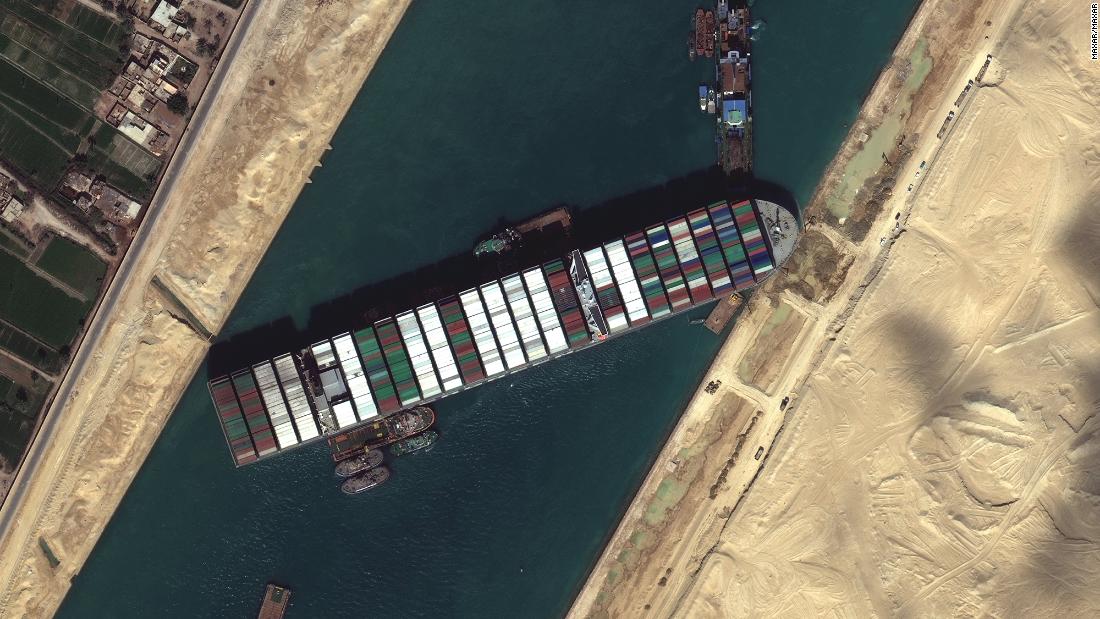Meanwhile, the accumulation of ships awaiting transit on the vital Egyptian waterway has grown to 326, according to Leth Agencies, the channel’s service provider.
The Syrian Ministry of Petroleum and Mineral Resources said the blockade of the Suez Canal “hindered the supply of oil to Syria and delayed the arrival of an oil tanker that transported oil and oil products to Syria,” said state-owned SANA.
Amid fears about fuel supplies, the Middle East country was forced to ration “the available quantities of oil products, mainly diesel and benzene, to ensure their vital availability for the longest possible time,” SANA said on Saturday.
The measure was taken “to ensure continuity in the provision of basic services to Syrians, such as bakeries, hospitals, water stations, communication centers and other vital institutions,” according to SANA, citing the ministry.
Syria will continue to ration its oil supply until “the return of normal navigation movement through the Suez Canal, which may take an unknown amount of time,” he added.
Ever Given, a huge ship almost as long as the Empire State Building is tall, ran aground on the Egyptian channel on Tuesday after being caught by 40-knot winds and a sandstorm. The authorities are also investigating possible human or technical errors.
The blockade, on what is one of the busiest and most important waterways in the world, can have a major impact on already stretched global supply chains, with disruptions increasing with each passing day.
A team of rescuers from the Dutch company SMIT Salvage and the Japanese company Nippon Salvage – who have worked in a number of high-profile operations in the past – has been appointed to help the Suez Canal Authority float the ship, the charter company Evergreen Marine said in a statement.
Speaking at a news conference on Saturday, SCA President Osama Rabie gave details of the rescue operation, which he described as “technically difficult” and “involving many factors”.
“We are facing a difficult and complicated situation, we work on rocky soil, the tides are very high, in addition to the enormous size of the ship and the amount of containers that make it difficult,” he said. “We cannot set a specific date for the ship to float, it depends on the ship’s response.”
About 9,000 tonnes of ballast water was removed from the ship, Rabie said, with dredging taking place during low tide, while 14 tugboats worked during high tide. Rescuers were able to temporarily restart the rudder and propellers on Friday night, before low tide paralyzed their efforts, he said.
Two additional heavy tugs are expected to arrive at Ever Given “probably early in the evening” on Sunday, a spokesman for Boskalis, a sister company of SMIT Salvage, told CNN.
The pair has a combined extraction capacity of about 400 tonnes, said spokesman Martijn Schuttevaer. Once the tugs arrive, it may take a few hours to connect to Ever Given, he said.
The chief executive of Boskalis said on Friday that he expects the extra pull force of the two tugs – combined with dredging, a 40 to 50 cm high tide and the “leverage” of the ship’s stern to be relatively free. – it is enough to start the container ship.
A crane that could be used to remove containers from the bow of the ship, in case the plan failed, also did not arrive, according to Boskalis.
On Saturday, Rabie described this scenario – which would lighten the ship’s cargo – as a lengthy and laborious process that they “hopefully” would not have to resort to.
Rabie added that the reasons behind the accident remain unclear. “There are many factors or reasons, fast winds and the sandstorm may have been the reason, but not the main reason – it could have been a technical error or human error,” he said. “There will be more investigations.”
In the meantime, billions of dollars worth of vital cargo and sensitive products are accumulating on the hundreds of ships whose path is blocked. About a dozen of them carry cattle.
The director of the NGO Animals International in the EU, Gabriel Paun, warned that thousands of animals transported on the ships – mostly Romanians – are at risk of dying if the situation is not resolved in the next few days.
CNN’s Magdy Samaan reported from Cairo and Mohammed Tawfeeq from Baghdad, while Laura Smith-Spark wrote from London. Mostafa Salem and Mick Krever of CNN contributed to this report.
